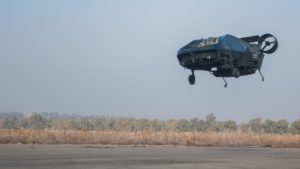
The remote-controlled UAVs would be able to arrive much sooner than ambulances which can be delayed by traffic jams and roadwork. Experts predict the drone could save hundreds of lives. – regional paramedics see, on average, three or more cardiac arrests calls each day.
Drones continue to evolve as potential medical response vehicles.
- Israeli security firm Tactical Robotics Ltd recently announced the first autonomous, untethered flight of the AirMule, an unmanned VTOL drone designed to evacuate injured personnel from the battlefield.
- In India, the nation’s National Programme for Micro Air Vehicles is working on pilot project in Bengaluru that would deploy drones to deliver organs such as hearts, kidneys and kidneys in far less time than traditional ground vehicles.
- Google recently won a new patent for an emergency drone call system. “The patent designates humanitarian drone communications systems that would send an appropriately equipped drone to the site of an emergency, enabling the delivery of critical equipment more quickly than a traditional ambulance stuck in traffic.”
- In 2014, an Austrian graduate student began developing a first-responder concept that combines drones, a mobile app, and crowdsourcing.
- A multinational research team has simulated a drone project that could deliver vaccines to Third World countries. After completing an initial simulation, researchers estimated that drone delivery decreased “logistics cost per dose administered by approximately 20 percent.”
- In Australia, volunteer-operated Surf Life Saving WA, plans to buy large military-grade drones to patrol beaches in Western Australia, providing swimmers with early shark warnings and emergency equipment. The not-for-profit partnered with Perth-based Shark Shield, a company that manufactures an electronic shark deterrent. Dubbed the “Little Ripper,” the single-rotor drone costs around $180,000 (USD) and is equipped with a high-def camera and a detachable pod that can hold emergency medical equipment, shark repellent and a life raft.
Jason is a longstanding contributor to DroneLife with an avid interest in all things tech. He focuses on anti-drone technologies and the public safety sector; police, fire, and search and rescue.
Beginning his career as a journalist in 1996, Jason has since written and edited thousands of engaging news articles, blog posts, press releases and online content.
Email Jason
TWITTER:@JasonPReagan
Subscribe to DroneLife here.